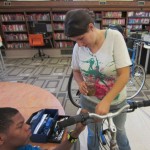I have a career as a technology specialist because of bicycle repair.
In 2004, a few years out of college, two friends and I started a business called New World Bicycle Repair. The start-up cost was just under $2000. We set up a shop in our house, installed a point of sale system, and created the name with an awesome logo. More importantly we got our hands dirty fixing bikes. We didn’t make much money, but we learned skills, practiced networking with the people in the community, and had an overall growth experience. After I was hired for my first tech job, my boss told me it wasn’t my tech certification that had gotten me the job. He said it was New World Bicycle Repair. It showed him I had a can-do personality and the ability to make something out of nothing: two things that our internet company was going to need.
I thought a lot about those days this week after I saw a picture on a facebook group called Makerspaces and the Participatory Library. Steve Teeri of the Detroit Public Library posted a picture of the library’s bicycle repair instructor from the neighboring bike shop: The Hub of Detroit. The picture was taken during one of the Teen Program’s Makerspace Workshops on bicycle repair.
This year, Detroit Public’s H.Y.P.E (Helping Young People Excel) program received a grant from Cognizant through their Making the Future Scholarship program. With this grant money a very hip teen room got the addition of some really cool tech: iMacs, a wireless enabled color laser printer, a cutting tool called the Silhouette Cameo, soldering irons, and bicycle repair and maintenance tools and consumables. This has allowed the library to have programming units on electronics, fashion, graphic design, papercraft, and finally transportation.
To start the bicycle section of the new Makerspace, Steve worked with The Hub to decide on purchases, these were very similar to the purchases me and my buddies made a decade ago: bike repair stand, wheel truing stand, wrenches, sockets, specialized chain and hub tools plus so many others bike specific tools you need when you start building bikes. They also were able to procure lubes, solvents, and inner tubes. Steve didn’t mention a parts washer but I have a feeling that was on the list, bike parts get awfully gunky.
The bike maintenance tools all totaled to just under $1000, leaving enough money that they can continue to support their programming through the end of the year. They continue to search for new grants to pay for new expenses that come with building and maintaining a Makerspace and provide programming. The Hub provides the instructor whom is paid $50 a week to lead a 2 hour instructional unit.This week the teens learned to re-cable their brakes. Let me tell you there is nothing like going from a bike with bad brakes to a bike with smooth, quiet, effortless brakes.
There’s an education crisis in the U.S.: a relative decline in science, technology, engineering and math (STEM) proficiency, fewer young people interested in STEM fields, and – perhaps most alarming – a decline in measured creativity. The future competitiveness and innovative capacity of the U.S., the quality of our workforce, and the prosperity of future generations are at risk. (From cognizant.com)
How do we prepare our teens for the future? How do we practice life long learning for the betterment of ourselves? How do we keep towns creating industry and commerce? How do libraries play a role in this?
I am personally committed to the Maker Movement. For ourselves, I see it as a form of expression and a path to the American Dream. For our towns I see it as a way to build on our culture and industries. For our country I see it as a way to to combat the education crisis and economic downturn. For our libraries I see Makerspaces as a way to continue to serve our patrons in the modern age.
Steve from Detroit Public’s H.Y.P.E. program said something along the lines of: libraries have always been about spaces for makers. I think he is right, that is why we always needed reference materials, and a place to shelve our masterpieces. Realizing libraries are also the location where the creation can happen is the next step.
Links:
- Bicycle Repair in the NExpress Catalog
- Zinn and the Art of Mountain Bike Maintenance, The Best All Around Deadwood Resource on Bike Repair
- Cognizant’s Making the Future Scholarship Guidelines (PDF)
- Cognizant’s Making the Future Scholarship Application (PDF)
H.Y.P.E Bicycle Repair Costs:
Tools & Supplies
- Bike mechanic took kit (Park Tool AK-37) – $300
- 1 Bike repair stands (Park Tool PCS-10) – $300
- 2 metric wrench sets (must contain 12mm-18mm) – $40
- 6 15mm wrenches – $12
- 2 12″ adjustable wrenches – $30
- 1 vice grips – $10
- 1 nut splitter – $15
- 1 rubber mallet/hammer – $10
- 1 tire pump – $30
- 1 large floor mat or protective tarp – $50
- 1 tube of lubricant – $20
- 1 bottle cleaner – $20
- 1 shop rags – $10
- 20 inner tubes – various sizes – $100
- 20 patch kits – $60
- 4 bike brake cable kits – $80
- 4 milk crates – Donation/Free?
- 1 Sterlite storage containers 6qt 12x – $21
- 1 Sterlite storage containers 16qt 12x – $60
- Various spare parts recommended by instructors – $100
Instructors for each weekly workshop:
- Experienced Bike Mechanic $25/hour x 2 hours – $50
- Teen Assistant $8/hour x 2 hours – $16
Photo Credit: “Gears.” by Flickr user ianmunroe under a Creative Commons license.